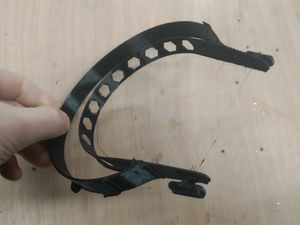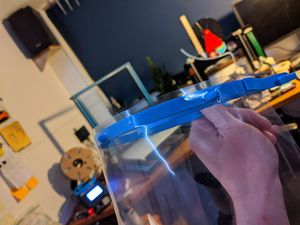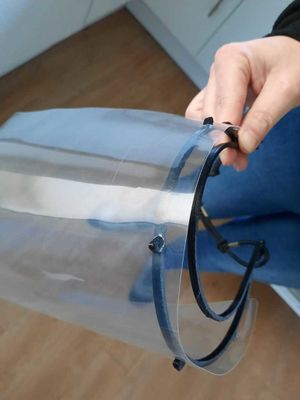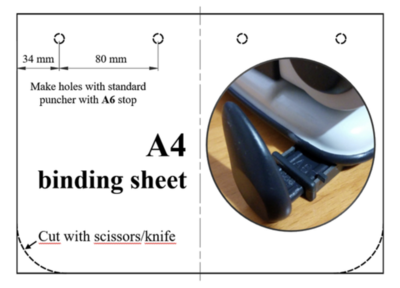Difference between revisions of "3D Printed COVID-19 PPE"
(→Visors) |
|||
| Line 37: | Line 37: | ||
== 3D Print Face Shields with Acetate Sheet Front == | == 3D Print Face Shields with Acetate Sheet Front == | ||
| − | |||
| − | |||
The designs we are primarily working with are as follows: | The designs we are primarily working with are as follows: | ||
Revision as of 13:30, 29 March 2020
This page summarises the effort by members to produce and supply personal protective equipment (PPE) for NHS staff in response to the current COVID-19 situation.
NOTE: THIS PAGE HAS BEEN FILLED BASED ON CONVERSATIONS ON THE SLACK CHANNEL AND HAS YET TO BE REVIEWED, PLEASE DO NOT TAKE IT AS A SOURCE OF AUTHORITY.
The Slack channel #covid-19-ppe is being used for discussion. The channel is a NO BIKESHEDDING ZONE and should only be used for co-ordination of the manufacturing and distribution effort.
If you are able to produce face shields, please log what you can on this sheet. The sheet will also be used for organising the collection effort.
We are trying to coordiante effors for producing visors. We are trying to work to just two standard designs - one 3D printed and one laser cut. We will update this page with both designs once confirmed.
Safety & Hygiene
Please do not compromise your own safety, or that of others, in order to obtain materials or access printers / laser cutters. Follow government guidelines and stay at home.
We must ensure that no risks at all are taken with regards to production of visors.
Please do NOT travel in order to make these unless totally safe to do so.
We must ensure that all visors come from COVID-19 free homes/workshops, handled as little as possible and, if needed, are handled in a hygienic way. If that is not the case then anything produced is not any use. If you or anyone in your household Covid-19 symptoms (however mild) or are self-isolating then any parts you supply could be an infection risk and will not be useful.
Before and after handling materials ensure you wash your hands following WHO guidance. Use sterile gloves, if at all possible.
Some notes for hygienic packing are given below.
Collaboration & Points of Contact
DrGandalf on Slack is our NHS contact.
Geoff Hampson, one of the directors at Kitronik, is also on the Slack channel. He may be able to help with manufacturing.
mgoodwin is part of the co-ordination of the shield making locally, and also someone from TechNotts.
Laser Cut Face Shields with Acetate Sheet Front
Co-ordination for a similar shield as the 3D printed version, using a laser cut polypropylene hand band. More information at LaserCutCOVID-19_PPE
3D Print Face Shields with Acetate Sheet Front
The designs we are primarily working with are as follows:
A4 Binding Sheet Face Shield
We have successful prints of this already. Our contact at the NHS has asked specifically for this design.
Members are currently printing 3 different versions of this headband:
| Design / File | Approx. Print time | Approx. Filament used | Image | Details |
|---|---|---|---|---|
| The original design | 60 - 90 Minutes | 10g | This is the original design of the A4 Binding Sheet Face Shield and is the version which we have originally been asked to produce, and is therefore the preferred version.
If your 3d printer is capable of printing this version quickly and reliably then please use this version. | |
| The adapted design | 60 - 90 Minutes | 10g | This design is the same as the above with two very small but important changes: the walls are double the thickness and the hexagonal holes have been removed.
This design will print well on lower quality, less functional 3d printers. | |
| The altered design | 30 -45 minutes | 12g | Whilst this design will maintain the same face to screen clearance and utilises the same punched acetates, it is significantly different from the original design. The walls are significantly thicker and the overall height of the band is considerably lower. 3D printers will be much more forgiving with this design (resulting in less failures) and will be able to print this version much quicker.
If your machine has had difficulty in printing the above two designs then please use this design. If you have a well calibrated machine you may want to attempt printing this version at your machines highest speed to increase your output. |
Fast Face Shield
Headbands
PETG filament is being recommended for the headbands because it is more likely to survive autoclaving, but at the moment we are expecting (based on information from DrGandalf) that these masks will be going to clinics, not hospitals, and will therefore not be going through autoclaves. Instead they will be wiped clean, so PLA is also fine for printing the head bands.
It may be better to laser cut headbands where possible, due to the tendency for FDM prints to produce surfaces that can harbour bacteria. More investigation and research is needed into making headbands on a laser cutter.
Regarding the FDM surface issue, at the moment we are working on the principle of something being better than nothing. We are still waiting on an official directive from infection control as to what materials and approaches are approved.
Visors
Visors can be made from A4 transparencies, as per the first design above. They can be acquired from Amazon:
Dominic Morrow has purchased some of these. We will know more about their suitability and properties when they arrive.
The hole punch must be a 2 hole punch set to A6 size. The holes are then punched from each side of the A4 clear binder cover/transparency. This is shown in the image here:
Packaging
Advice from NUH contact regarding the official NHS masks: '"we can't autoclave the OFFICIAL shields we get because they have foam parts, they have to go in the bin" and that "the ones we get from the NHS centrally turn up in boxes, not bags, they're not clinically clean. They DO have a bit of film over them, like a racing drivers visor, but that's just to stop stretches in transit. What you're making as long as you take basic precautions, will work well for us at this time."'
On that basis, we are assuming that provided the masks are produced in conditions where there is no known risk of COVID-19 (i.e. none of the conditions for self-quarenteen are met) and the masks and materials are handled with clean hands then they may be delivered without any special cleaning or packaging.
Safety Concerns
Please do not compromise your own safety, or that of others, in order to obtain materials or access printers / laser cutters. Follow government guidelines and stay at home.
FDM prints leave a lot of small microscopic holes in the surface, which can harbour bacteria. While not much can be done about this, and it isn't ideal, we have been told that it's currently a case of "anything is better than nothing", and that cleaning will be rigorous. For now it is probably a good idea to try to seal the surface of FDM prints with a surface sealer, epoxy, or with a flame if those aren't available. Laser cutting may be a better option but, again, FDM prints are better than nothing.
Delivery
Locations known to have an interest include:
- Bulwell Riverside
- St Anns Wells Health Centre
- Mary Potter Health Centre
- Clifton Conerstone
- NCGPA at Upper Parliament St.
- Nottingham University Hospital
NOTE that we are still lacking details on how best and when to deliver to these locations. If you find specific information on their level of need and preferred delivery method then please add this to the Wiki.
There may be a pick-up arrangements too, TBA.
Important Slack Messages
The following messages were copied from Slack, as they contain particularly helpful information:
- geoff hampson (2020-03-25 7:00PM): My opinion for what it is worth is if we want to be able to manufacture these in the quantities that are going to be required then it needs to be laser cut. Even with lots of people 3D printing parts the capability just won't be there. The laser cut version looks ok, but I think with a big bed some parts could be combined and I think with the right design the parts could slot together eliminating the need for the plastic rivets. What will also be essential in production is processes to ensure that the parts aren't contaminated otherwise the finished items won't be able to be used for days. We can't risk ppe being supplied with Coronavirus on it.
- DrGandalf (2002-03-25 8:29PM): Hi all. Sorry missed the zoom. In one day have learnt the power and challenge of using Slack, negotiating in the NHS infrastructure and the amazing work our community can do.
- I'll try and summarise from what I know so far and then I'll answer what I can from the medical perspective.
- 1. We will need as many visors as we can get.
- 2. Because of repeatedly pushing this - hopeful that the universities are able to join in and produce in a large scale.
- 3. Your willingness and contributions have blown me away.
- 4. I am trying to sort logistics re bands and visors with @Dominic Morrow, @mgoodwin and others.
- 5. Re not being medical grade-so far the answer is we need them and better than nothing. If genuine concerns will be single use but more likely one clinician per day.
- 6. Regarding the plastic sheet version I am trying to get a better idea from infection control but this will take a day or two unfortunately - bureaucracy still exists.
- 7. My next plan is to focus on logistics given you are all in lockdown for collection. Hoping we can arrange a collection service for distribution to ensure your work is used by NHS and social care and not misusing your support. For this reason if you have made anything please use this spreadsheet bit.ly/NottsRC2



